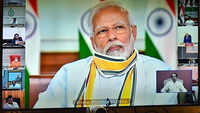
LONDON: Plastic spacing barriers and millions of masks appeared on Monday on the streets of Europe’s newly reopened cities, as France and Belgium emerged from lockdowns, the Netherlands sent children back to school and Spain let people eat outdoors.
All faced the delicate balance of trying to restart their battered economies without causing a second wave of coronavirus infections. Fears of infection spikes have been borne out over the past few days in Germany, where new clusters were linked to three slaughterhouses; in Wuhan, the Chinese city where the virus started; and in South Korea, where a single nightclub customer was linked to 85 new cases.
In France, where restrictions vary by region depending on how seriously afflicted they are, some schools and shops reopened and some hair salons were fully booked. But in Paris and elsewhere, restaurants and theaters remained closed, and masks were still mandatory in public.
In Germany, the gradual easing of movement restrictions continued on Monday with more children returning to classrooms, but authorities there and in France have warned that a rise in the daily number of infections could lead to new restrictions.
Roughly half of Spain’s 47 million people shifted into a softer version of the country’s strict confinement, beginning to socialise, shop in small stores and enjoy outdoor seating in eateries and bars. But residents of the two largest cities, Madrid and Barcelona, remained under tighter controls.
In Britain, PM Boris Johnson said “anyone who can’t work from home should be actively encouraged to go to work”. Critics said the advice was confusing and potentially dangerous — especially in a big city like London, where most people do not own cars and where subways are operating at a fraction of their capacity. In Australia, popular beaches that sat empty are open again for exercise. Children across Sydney returned to school.
However, the first new infections in weeks at China’s ground zero offered a sobering reminder of the dangers of a second wave of cases. China on Sunday reported that one person had tested positive for the virus in Wuhan. There were five more cases on Monday. T he new cases were all from the same residential compound.
And neighbouring South Korea announced its highest number of infections for more than a month driven by a cluster in a Seoul nightlife district. Officials reported 35 new cases as of midnight on Sunday. The government has pushed back hard against new infections, halting school reopenings and reimposing restrictions on nightclubs and bars. It is also trying to track down 5,500 people who had visited the popular Seoul district by checking credit-card transactions, cellphone records and security camera footage.
All faced the delicate balance of trying to restart their battered economies without causing a second wave of coronavirus infections. Fears of infection spikes have been borne out over the past few days in Germany, where new clusters were linked to three slaughterhouses; in Wuhan, the Chinese city where the virus started; and in South Korea, where a single nightclub customer was linked to 85 new cases.
In France, where restrictions vary by region depending on how seriously afflicted they are, some schools and shops reopened and some hair salons were fully booked. But in Paris and elsewhere, restaurants and theaters remained closed, and masks were still mandatory in public.
In Germany, the gradual easing of movement restrictions continued on Monday with more children returning to classrooms, but authorities there and in France have warned that a rise in the daily number of infections could lead to new restrictions.
Roughly half of Spain’s 47 million people shifted into a softer version of the country’s strict confinement, beginning to socialise, shop in small stores and enjoy outdoor seating in eateries and bars. But residents of the two largest cities, Madrid and Barcelona, remained under tighter controls.
In Britain, PM Boris Johnson said “anyone who can’t work from home should be actively encouraged to go to work”. Critics said the advice was confusing and potentially dangerous — especially in a big city like London, where most people do not own cars and where subways are operating at a fraction of their capacity. In Australia, popular beaches that sat empty are open again for exercise. Children across Sydney returned to school.
However, the first new infections in weeks at China’s ground zero offered a sobering reminder of the dangers of a second wave of cases. China on Sunday reported that one person had tested positive for the virus in Wuhan. There were five more cases on Monday. T he new cases were all from the same residential compound.
And neighbouring South Korea announced its highest number of infections for more than a month driven by a cluster in a Seoul nightlife district. Officials reported 35 new cases as of midnight on Sunday. The government has pushed back hard against new infections, halting school reopenings and reimposing restrictions on nightclubs and bars. It is also trying to track down 5,500 people who had visited the popular Seoul district by checking credit-card transactions, cellphone records and security camera footage.
Download
The Times of India News App for Latest World News
Get the app










